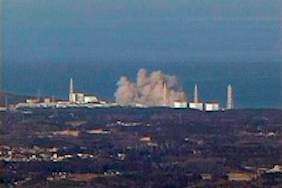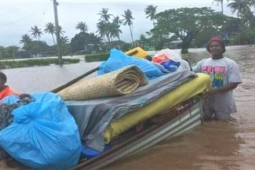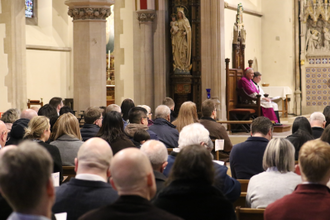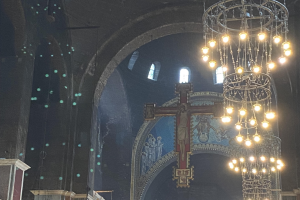Mark Dowd: 'My Tsunami Journey: the Quest for God in a Broken World'
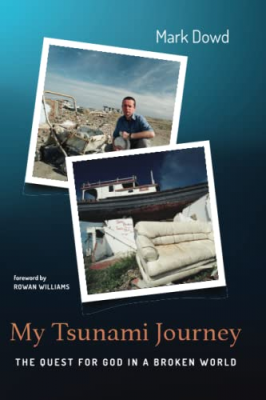
As idyllic settings go for a Christmas family reunion it couldn't have been better. The picturesque village of Grindleford in the rolling hills of the Derwent Valley in the Peak District. This was December 2004 and after a glorious day's hiking on snow-frosted peaks, the Dowd family tuned into the Boxing Day BBC 1 evening news bulletin. Corpses being dragged out of mud. Cars and houses crushed by a natural phenomenon that few of us had even heard of. Buddhist monks turning their temples into morgues on an industrial scale. This was beginnings of the carnage that was the Indian Ocean tsunami which claimed almost a quarter of a million lives.
At the end of the news, my ashen-faced father uttered the words that changed my life forever. "God could have stopped that," he said. I repeated these words to the head of Channel Four religious programmes the following morning. By the end of the day he had secured £250,000 for a two hour TV special in which I would endeavour to grapple with the question that has dogged us all since the Book of Job: why would a loving God create a world in which the virtuous suffer at the hands of horrendous diseases like Covid 19, earthquakes, cyclones and tornadoes? Was this the best that God could do? Why couldn't we just have the good bits and be spared the bad stuff?
The free will defence isn't without its problems, but if humankind abuses its freedom, then murder, rape and even genocide are much less difficult for me to reconcile with a benevolent Creator than so-called "natural evil." So the ensuing journey, spread over seven weeks brought me face to face with Muslims in Banda Aceh, Indonesia, Hindus on the coast south of Chennai and Buddhists on the Thai coast. We met people like Fadil, in Sumatra , who lost nineteen family members on the day of his brother's wedding yet who told me that his faith and trust in Allah was now stronger as he had nowhere else left to turn to. "This is my test," he said, clutching a battered copy of the Qu'ran in the mosque where the enormous tsunami wave had carried him. In contrast, Poonghuzali who lived in a hastily erected corrugated iron hut just inland from the coast of Tamil Nadu told me how she had lost her husband and two children. "I hate God, because all these years I have made offerings faithfully and God could not protect me and my family."
All the usual explanations were offered by the many gurus, imams and clergy: that God allows suffering to enhance our character, that God is unknowable and beyond comprehension therefore the question is void. I was also told that it may be divine punishment for sin (really? Babies that die of leukemia? Try that on the parents.) Or a Christian favourite: it is all down the Fall. The laws of nature got mangled irrevocably when our ancestral parents turned against God. Except that death, disease and the elimination of species predates homo sapiens. Humanity's status as complex life depends on the very processes at work in evolution that cause such occasional suffering and distress.
I'd returned from the Indian Ocean with still so many unanswered questions. And then, a bolt from out of the blue. Three months before our scheduled documentary transmission, there was to be a symposium on "scientific perspectives on natural evil" in none other than the Vatican Observatory at Castel Gandolfo, the Pope's summer residence just twenty miles south east of Rome. A one week gathering of some of the world's leading lights, addressing the very heart of my enquiry. Coincidence? Or divinely inspired televisual manna from heaven? Either way, I rang up Fr George Coyne SJ who headed the Jesuit community at the Observatory and sealed our visit with the cameras.
On our first full day of filming, we attended a session given by Professor Nancey Murphy of Fuller Seminary, California. She was quoting an article from the New York Times on "crustal recycling." "If we have a movable crust, we're going to have earthquakes and if we have earthquakes underwater, we're going to have tsunamis," she said. "But if we didn't have a crust that moved, basically the whole surface would be smooth and given the amount of water on it, it would be marshland all over. So you could have basic forms of life, but certainly not complex creatures like us." Just when you thought that tectonic plates were agents of the devil, we were being told that their movement regenerated the surface of the earth, ploughing up minerals and ores necessary for agriculture. Other examples of nature's positive/negative ambiguity abounded. The mosquito, yes, transmitter of malaria and other horrid diseases, but also arch pollinator and decisive presence in nature's food chain. Hurricanes and cyclones, unquestionably destructive to humans, but whose heat and energy transferring properties were essential for maintaining a global equilibrium. "It's all in scripture," said Fr Coyne. "Unless a grain of seed die and fall into the ground, I tell you, you cannot have new life." Among those gathered, it was not unanimous, but there was a broad consensus for a view of the natural world echoed in that image of the Hindu god, Shiva, where the multiple arms denote the interconnected aspects of the Divine. Creation and destruction are not separate entities belonging to warring forces in the Universe. They are two sides of one coin. Asking God to make a material world devoid of rough edges would be tantamount to demanding that two and two equal five. Nature's lamp casts an inevitable shadow. God cannot perform the logically impossible.
But that only set in train more questions, questions which I would fire at the esteemed delegates in the next day or two. If a loving creator cannot bring about a material world without some element of pain and suffering for complex, sentient creatures made in Gods image, then why create at all? This is essentially the knub of the famous exchange between Ivan and Aloysha in Dostoevsky's classic, The Brothers Karamazov. On a huge balcony overlooking the majestic Lake Albano below, I quizzed Philip Clayton, philosopher of science at the Claremont School of Theology. This was a man who had grappled for years with this very question of why God would push the button and bring a material universe into being.
"I would love to imagine a divine who stood before that button and wept and somehow at the last minute felt it was better to have us than to have only the divine in eternal emptiness," he told me. "That God pushed that button and made creation, hints at a mystery that we don't understand. It hints at a resolution that we only hope for: God will only be God if the outcome is something so far better than what we see around us that it would make it alright. But I can only say that as a wish and a hope and not as an item of knowledge."
Clayton told me, after our on camera chat, that a chance encounter had been crucial to his continuing faith in God. But just as I was about to quiz him, he was swept away to a meeting. Sixteen years later, putting all this into print for a forthcoming book, something inside me urged me to contact him and spell out exactly what he had been alluding to back in the autumn of 2005. So at 6am local time in California, he met me on Zoom to tell me about going as a student to Germany, living the life of Riley and losing his faith. He'd studied philosophy and basically "the arguments for God didn't stack up." Then he got a phone call from an old parish associate called Bobby who was located precariously at the top of a nearby mountain. He was mentally disturbed and about to take his own life. Clayton drove like the clappers on his motorbike and talked him out of it. It was his Road to Damascus experience. "I had no choice but to respond. This did not make sense unless there is a God. And then with that level of realization I came to the conclusion that, whatever I say, I just fundamentally believe in God, in some sort of reality-grounded being that I cannot escape." I put it to him that any decent human being would have done what he did, irrespective of their take on God but Clayton is adamant that it awoke in him a deep sense of "ultimate reality." He has stopped using the word "God" He know refers simply to "UR." It was his moment of Epiphany.
I ended that Channel Four documentary by standing under that huge cross in Westminster Cathedral and offering the hope that a crucified God met us in suffering and pledged it would not be His last word. It was fine as far as it went, but it smacked a trifle of "jam tomorrow" in the Resurrection. Seventeen years on after that film aired, I know cleave more towards Incarnation as a pointer to the eternal mystery of why a benevolent Creator has fashioned a world that inextricably mixes rainbows and excruciating pain, immense sunsets and crippling cancers. If matter is inevitably ambiguous, then the incarnate Word inhabits that Janus-faced focal point to live out a short existence that blends total non judgemental love with unbearable pain and an early death. Jesus is the meeting point of matter and spirit, the meaning and answer to all of history.
When my father pointed to those shocking tsunami images on TV and said "God could have stopped that," I was lost for words. There is no trite answer, no easy formulaic response and as the philosopher DZ Phillips wisely wrote, "it is easy for us, intellectuals, to add to the evil in the world by the ways in which we discuss it." But after giving extensive thought to this most vexing of issues, and Voltaire would hate me for saying it, Leibniz probably had it right. This is, surely, the best of all possible worlds, for any God that had other feasible options that involved less suffering and pain and still forged ahead with the Universe we observe would rightly be in the dock.
I still look through a glass darkly, but these days it is a trifle easier to utter those words, "Lord I believe, help thou my unbelief."
Mark Dowd's 'My Tsunami Journey: the Quest for God in a Broken World' is published by Resource Publications, courtesy of WIPF and Stock.



